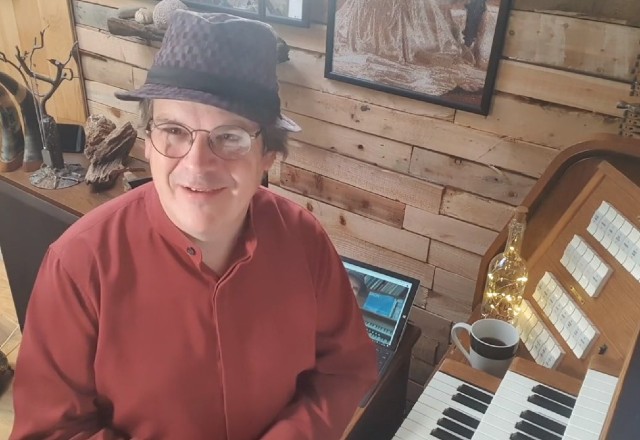You suddenly find you have to fill a gap with some organ improvisation in a middle of a service. In all of the organ lessons you have had so far, you have been looking at a book, marking fingerings, pedalling, registration and notes with a pencil and suddenly there’s nothing in front of you.
PANIC! No, not true, “Don’t panic”! All you need are a few organ improvisation techniques.
I am Robin Harrison, known as “The Maestro Online” and I teach online as well as face-to-face. I am fortunate to be part of the Royal College of Organists Academy teachers and really enjoy my work for them, annually teaching on their International Summer School.
I regularly teach improvisation workshops and courses as well as individual lessons to my private students. I am here to demystify the art of organ improvisation and to put you at ease!
1 Introduction – Organ Improvisation from Robin Harrison on Vimeo.
How is Organ Improvisation often taught, Improvising for Beginners?
The daunting thing is often that a teacher will begin with, “well you need to develop your keyboard harmony”.
It is true that keyboard harmony is a route into improvisation that many advanced improvisers utilise, but the idea that you need extensive keyboard harmony before you begin is not true, so don’t be put off because you can improvise TODAY!
Organ Improvisation historically
In modern times, organ improvisation seems to be an ‘add-on’ to playing pieces and passing grade examinations.
However, Has it ever occurred to you that in the Renaissance, Baroque and Classical eras you couldn’t simply buy a tutorial off the shelf that taught you how to play, putting your thumb on middle C and then adding a D? Actually, the art of teaching improvisation was the art of learning to play.
Organ Improvisation v Composer v Solo Organist
The distinction between organ improvisation and composition is simply a time-line detail. Improvisation is relatively ‘on-the-spot’ (although don’t be fooled because you will discover later that preparation is perfectly normal) and composition is the same process with more time for development and refinement.
The difference between an organist, improviser and composer, ‘back in the day’, would therefore also have had little distinction. Organists would learn progressions and patterns and either improvise on them for the listener, or improvise on them and then write them down.
Renaissance and Baroque composers (who, by the way, are not really historically separate from ‘performers’) had certain formulas that they learned and turned to. The problem with improvisation is that the options are almost unlimited, so “where do I start?” Stravinsky was famous for describing a blank piece of manuscript as the most daunting thing because he had too many options, but once he had two notes down, he knew where he was going! The best thing is to limit your options and then your mind becomes much more creative. In this article, we will pursue the two chord pendulum. The method used here is not set out for historical critique, but rather is historically inspired.
Organ Improvisation with One Chord
In the next article, “Organ Improvisation: Improvising with One Chord“, we improvise with just one chord creating a trumpet tune and even a full voluntary.
Just one chord? Now that sounds manageable!
Below is one of the videos from the next blog on Improvising with One Chord:
Reveille A Major 2nd Inversions-converted from Robin Harrison on Vimeo.
About Dr Robin Harrison – The Maestro Online
Dr Robin Harrison PhD BMus(Hons)/GradRNCM FNCM ARCO LTCL DipLCM PGCE(QTS) MISM is your supportive, holistic piano lesson, organ lesson, singing lesson teacher & vocal coach. He has 30 years of teaching experience and well qualified teacher with composition, piano, organ and singing diplomas alongside a conservatoire degree and musicology PhD.
Robin offers organ lessons for pupils of all ages from beginner organists through to Fellowship diploma organ students. An academy organ teacher for the Royal College of Organists (RCO), annual summer school organ teacher, masterclass deliverer, improviser, diploma paperwork examiner and aural trainer.
Dr Robin Harrison PhD BMus(Hons)/GradRNCM FNCM ARCO LTCL DipLCM PGCE(QTS) MISM is your supportive, holistic piano lesson, organ lesson, singing lesson teacher & vocal coach.



